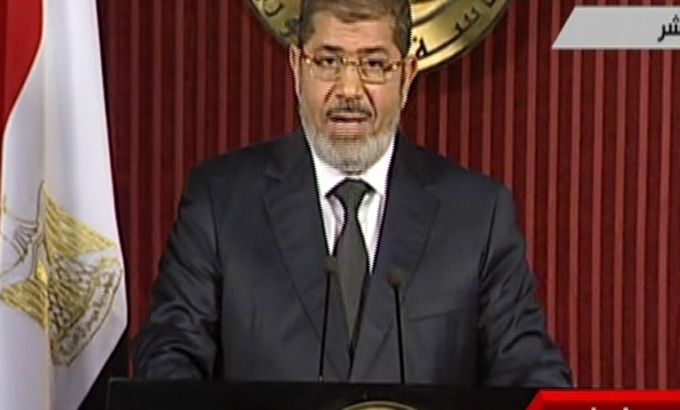Morsi addresses Egypt amid ongoing unrest
At least seven people have been killed and more than 770 injured in clashes outside the presidential palace in Cairo.

Egyptian President Mohamed Morsi expressed sorrow for ongoing violent protests outside his palace and called for dialogue in a speech on Thursday night, but offered no concessions to Egypt’s increasingly polarised opposition.
Seven people were killed, and more than 770 injured, during hours of clashes outside the presidential palace on Wednesday. Supporters of the president attacked a group of opposition protesters staging a peaceful sit-in outside the palace, using firebombs, clubs and guns, according to witnesses.
In his speech, Morsi called the violence “regrettable,” and blamed it on “infiltrators” funded by unnamed third parties.
“Such painful events happened because of political differences that should be resolved through dialogue,” he said.
His speech, still ongoing, comes amidst ongoing unrest in the Egyptian capital. At least five tanks were deployed outside the palace on Thursday, according to the army. The state news agency said the military deployment was to “secure” the building. Nine armoured troop carriers were also reported on the street outside the palace.
The violence that had stretched from Wednesday afternoon into the early hours of Thursday had abated by morning, and the streets were calm. The soldiers were members of the Republican Guard, whose duties include protecting the president and his offices.
“The Republican Guard began a deployment around the headquarters of the presidency … to secure the headquarters of the presidency in its capacity as a symbol of the state and the official headquarters of government,” the agency reported.
Yet violence had picked up again by Thursday afternoon as the opposing sides began throwing stones at each other, despite the military presence.
Angry mobs battled
The fighting erupted late on Wednesday afternoon when thousands of Morsi’s supporters descended on an area near the presidential palace where about 300 of his opponents were staging a sit-in.
Members of Morsi’s Muslim Brotherhood chased the protesters away from their base outside the palace’s main gate and tore down their tents.
After a brief lull, hundreds of Morsi opponents arrived and began throwing firebombs at the president’s backers, who responded with rocks.
The deployment of hundreds of riot police did not stop the fighting. The police later fired tear gas to disperse Morsi’s opponents.
Egypt’s top Islamic body also called on the president to suspend his constitutional decree, and demanded unconditional dialogue between Morsi and his opponents. Al-Azhar said Morsi should “suspend the latest decree and stop using it,” in a statement issued on Thursday.
Morsi, for his part, seemed to be pressing relentlessly forward with plans for a December 15 constitutional referendum to pass the new charter.
Another official resigns
A prominent Christian said he had resigned from his role as an aide to President Morsi and a senior official in the Muslim Brotherhood’s Freedom and Justice Party.
“I have decided to retire from any political work and to withdraw from any political role … including withdrawing from any role in the presidency and the Freedom and Justice Party,” Rafik Habib said in a statement on his official Facebook page.
It was not immediately clear from the statement what had prompted Habib to step down.
Compounding Morsi’s woes, four of his advisers resigned on Wednesday, joining three other members of his 17-member advisory panel who have abandoned him since the crisis began.
The large scale and intensity of the fighting marked a milestone in Egypt’s deepening schism, pitting the Brotherhood and ultra-conservative Islamists in one camp, against liberals, leftists and Christians in the other.
The violence spread to other parts of the country on Wednesday. Anti-Morsi protesters stormed and set ablaze the Brotherhood offices in Suez and Ismailia, east of Cairo, and there were clashes in the industrial city of Mahallah and the province of Menoufiyah in the Nile Delta north of the capital.
There were rival demonstrations outside the Brotherhood’s headquarters in the Cairo suburb of Moqatam and in Alexandria, security officials said senior Brotherhood official Sobhi Saleh was hospitalised after being severely beaten by Morsi’s opponents.
The opposition is demanding that Morsi rescind the decrees giving him nearly unrestricted powers and shelve the controversial draft constitution, which the president’s Islamist allies rushed through last week in a marathon, all-night session shown live on state TV.
Mohamed ElBaradei, a leading opposition reform advocate, said late on Wednesday that Morsi’s rule was “no different” than Mubarak’s.
“In fact, it is perhaps even worse,” the Nobel Peace Prize laureate told a news conference after he accused the president’s supporters of a “vicious and deliberate” attack on peaceful demonstrators outside the palace.